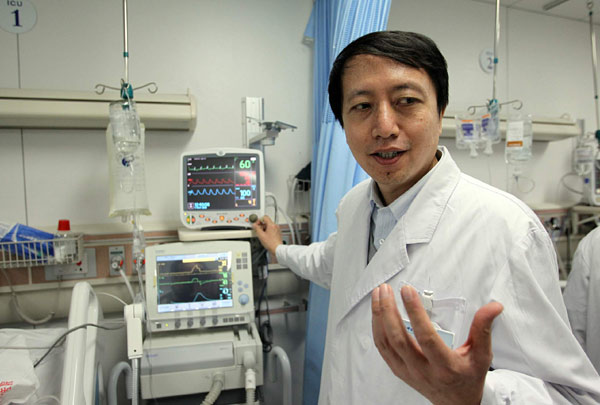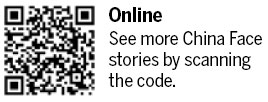Recovering one step at a time
Updated: 2013-03-27 07:42
By Liu Zhihua (China Daily)
|
||||||||
|
 Yin Peigang, China-Japan Friendship Hospital's first medic infected by SARS, resumes full-time work in 2011 after taking eight years to recover from the disease. Zhang Wei / China Daily |
A doctor infected by SARS had to relearn how to walk and work, and is only now completing his recovery a decade later. Liu Zhihua reports.
Editor's Note: Ten years ago, the world was hit by the Severe Acute Respiratory Syndrome (SARS) epidemic. Thousands lost their lives, including medical workers all over the world who selflessly looked after patients in spite of the high risks of infection. The effects of the dreaded virus still reverberate to this day. In a series of reports, China Daily highlights the human faces behind the news.
Yin Peigang never imagined treating a patient with a strange respiratory disease would mean he'd have to relearn how to walk.
The senior doctor at the China-Japan Friendship Hospital's intensive care unit also never dreamed that day in late March of 2003 would mean he would have to relearn his job. He'd just become deputy director of the ICU, where he'd worked since the 1990s.
"It seemed like any other day, but it changed everything," Yin says.
It was a Wednesday, and Yin was about to clock out when he got a call from another department requesting help with a patient experiencing respiratory failure.
On Friday night, Yin suffered chills and a fever.
The next morning, he calmly told his wife he'd likely contracted an unknown illness and would have to stay away from the family.
Turns out, he was the hospital's first medical staffer infected by SARS.
On Sunday, the patient he'd treated died.
"The onset was quick, but the recovery was slow and painful," Yin says.
He suffered infections in his lungs, kidney and brain.
Yin's family and friends were supportive, he says. His wife left their children with friends and relatives to accompany him through those dark days. Colleagues dropped in to give him pep talks. The staffers who treated him - 30 when his illness peaked - were devoted, too, he recalls.
"Beijing was a ghost town, but they weren't scared around me," Yin says.
He improved after two major surgeries and was cured in late 2004.
But struggles followed.
His muscles had degenerated from a year spent mostly in bed, the disease's toll and the treatments' side effects. He could barely move.
His heart, organs and lungs had weakened, too, he says.
The hospital bought an imported walker for him, and he relearned how to walk through grueling exertion. Initially, a nurse would help him out of bed and he'd take a single step using the walker and spend the rest of the day recovering.
After two months, he could walk almost 20 meters down the hallway. "It was my life mission to walk 20 meters every day," Yin recalls.
"As a doctor, I understand it takes time to recover. I never panicked but focused on my progress, even if I could only hit a milestone every two weeks."
Within six months, he could walk for 10 minutes without a break.
Yin started riding a specially designed bicycle. At first, he needed to rest after 30 minutes on the bike.
In May 2005, he could walk for 20 minutes with crutches one to three times a week, and decided to leave the hospital.
By early 2007, he could work half a day.
"I'd been out of work for too long and had missed many developments in my field," he says.
"I'd also forgotten much of what I already knew."
The hospital allowed him to keep his position, and colleagues helped him catch up.
He followed colleagues on morning rounds to re-familiarize himself with symptoms and treatments.
After work, he read books and papers, prepared ICU training for doctors and nurses from other departments, and attended lectures.
"At least learning everything again was easier than learning it the first time," Yin says.

"My colleagues are very patient. I know how to act toward patients better after being one, too."
He began full workdays in 2011.
The hospital's former vice-president Liu Xiaoqin says: "Yin has a strong sense of duty and never complained about his misfortunes."
While it has been a harrowing path, Yin says he'd do it again. "SARS stole nearly a decade of my life, but I don't regret treating that patient," he says.
"Saving lives is a doctor's duty. I just hope the country can learn from the epidemic and pay more heed to public health and welfare."
Contact the writer at liuzhihua@chinadaily.com.cn.
(China Daily 03/27/2013 page20)

 'Taken 2' grabs movie box office crown
'Taken 2' grabs movie box office crown
 Rihanna's 'Diamonds' tops UK pop chart
Rihanna's 'Diamonds' tops UK pop chart
 Fans get look at vintage Rolling Stones
Fans get look at vintage Rolling Stones
 Celebrities attend Power of Women event
Celebrities attend Power of Women event
 Ang Lee breaks 'every rule' to make unlikely new Life of Pi film
Ang Lee breaks 'every rule' to make unlikely new Life of Pi film
 Rihanna almost thrown out of nightclub
Rihanna almost thrown out of nightclub
 'Dark Knight' wins weekend box office
'Dark Knight' wins weekend box office
 'Total Recall' stars gather in Beverly Hills
'Total Recall' stars gather in Beverly Hills
Most Viewed
Editor's Picks

|

|

|

|

|

|
Today's Top News
Boston bombing suspect reported cornered on boat
7.0-magnitude quake hits Sichuan
Cross-talk artist helps to spread the word
'Green' awareness levels drop in Beijing
Palace Museum spruces up
First couple on Time's list of most influential
H7N9 flu transmission studied
Trading channels 'need to broaden'
US Weekly

|

|







